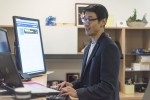Student advisers to the Office of Equity, Diversity and Inclusion met with Vice Chancellor Jerry Kang and other administrators last Thursday.
The Office of Equity, Diversity and Inclusion created the advisory board in January to have students play a role in helping address campus climate issues.
Evelyn Carter, a member of the EDI office’s BruinX team who will be working with the board members, said the advisors will serve as problem solvers and liaisons for the office.
Carter said that because this is the first advisory board the EDI office has ever had, it is still deciding many of the board’s roles and functions.
“We want the board to be a bit autonomous and give students (on the board) the freedom to shape their roles,” she said.
[Related: Equity, diversity and inclusion office announces board members]
The board consists of 16 undergraduate and graduate students from diverse backgrounds. The office intentionally picked students to represent a variety of backgrounds at UCLA, Carter said.
“We want these students to be able to let us know what the different identities at UCLA think of our work,” she said.
Several of the students on the board said they became interested in diversity issues because of their backgrounds.
Annie Guilyard, a third-year political science student and board member, said that as a Puerto Rican and Filipino-American, she occasionally experienced implicit bias while growing up in a largely Caucasian community in Pennsylvania.
“I remember my mother stopped talking in Tagalog to my sister and me because a teacher complained that my sister had an accent,” she said.
Guilyard said her experiences with bias motivated her to increase opportunities for minorities and fight against institutional bias.
Krystal Cunningham, a graduate student in materials science and engineering and a student board member, said she became more interested in inclusion issues when she realized she was the only female African-American student in her research department.
“This spoke to not only the lack of diversity at UCLA but also the lack of inclusion,” she said. “My experience these past two years at UCLA has been isolating in the context of feeling (like) a part of the greater UCLA community.”
The students on the board have various other campus affiliations, which some said influenced their role on the board.
Chloe Pan, a board member and a third-year international development studies and Asian American studies student, said her work in the Bruin Consent Coalition helping sexual assault victims has helped her better understand how to provide a safe space for different types of people.
“We help anyone who has suffered from sexual assault, regardless of their political views or ethnic background,” she said. “I personally have a strong policy to make sure that a survivor does not feel uncomfortable.”
Guilyard, who is a member of the Army ROTC at UCLA, said she hopes to use her military background to talk about issues that active duty students and veterans on campus face, such as mental health.
Many of the board members said they think the biggest campus climate issue facing UCLA is a lack of dialogue between UCLA students from different backgrounds.
Guilyard said she thinks students on campus tend to retreat into their respective groups.
“People on campus generally don’t want to talk about hot button issues,” she said. “Students prefer to stick with what they’re most comfortable with.”
Josh Tran, a third-year political science and Chinese student and board member, said he thinks different groups need to have solidarity to tackle equity and inclusion issues that affect all students.
“I think the (Office of Equity, Diversity and Inclusion) can become a link to bridging our struggles together and find common ground,” he said.
[Column: Kang must reach more students to improve campus equity]
Several of the students on the board said they hope to use their position to act as a bridge between students and the administration.
Pan said she is excited for the the problem-solving aspect of her position on the board.
“Any person can complain, but our job is to actually come up with actionable solutions,” she said.
Tran said he wants to have open, face-to-face conversations with students to hear their concerns.
“If I can have a genuine conversation with even just one student and be able to share their story with the board and have something come out of that, I would be happy,” he said.
